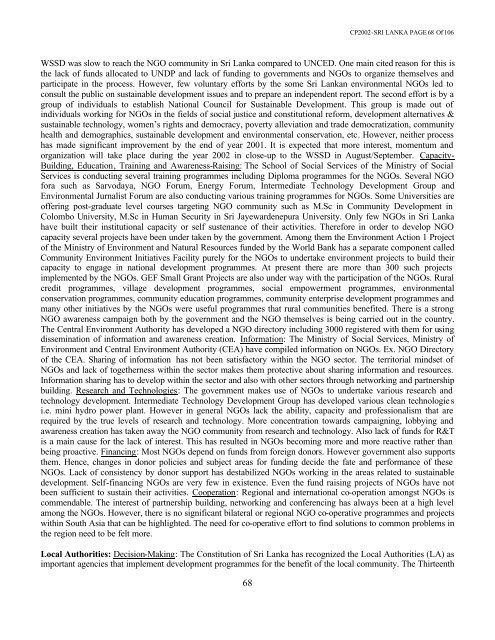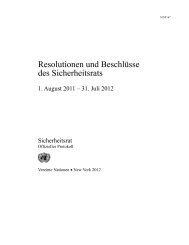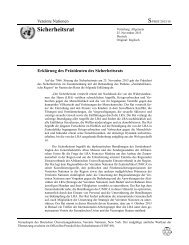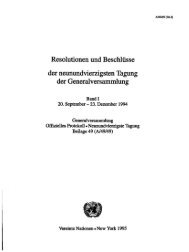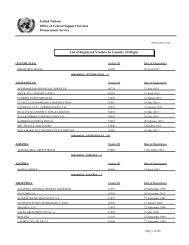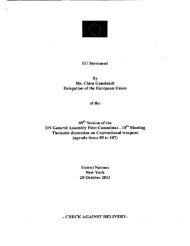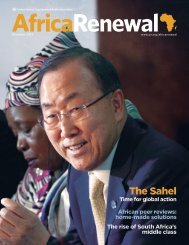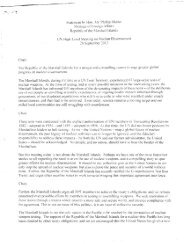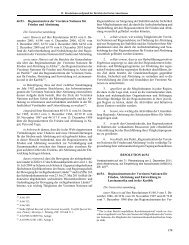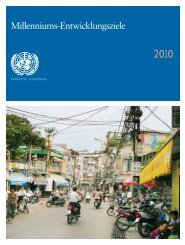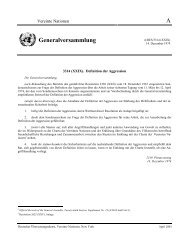SRI LANKA COUNTRY PROFILE
SRI LANKA COUNTRY PROFILE
SRI LANKA COUNTRY PROFILE
Create successful ePaper yourself
Turn your PDF publications into a flip-book with our unique Google optimized e-Paper software.
68<br />
CP2002-<strong>SRI</strong> <strong>LANKA</strong> PAGE 68 Of 106<br />
WSSD was slow to reach the NGO community in Sri Lanka compared to UNCED. One main cited reason for this is<br />
the lack of funds allocated to UNDP and lack of funding to governments and NGOs to organize themselves and<br />
participate in the process. However, few voluntary efforts by the some Sri Lankan environmental NGOs led to<br />
consult the public on sustainable development issues and to prepare an independent report. The second effort is by a<br />
group of individuals to establish National Council for Sustainable Development. This group is made out of<br />
individuals working for NGOs in the fields of social justice and constitutional reform, development alternatives &<br />
sustainable technology, women’s rights and democracy, poverty alleviation and trade democratization, community<br />
health and demographics, sustainable development and environmental conservation, etc. However, neither process<br />
has made significant improvement by the end of year 2001. It is expected that more interest, momentum and<br />
organization will take place during the year 2002 in close-up to the WSSD in August/September. Capacity-<br />
Building, Education, Training and Awareness-Raising: The School of Social Services of the Ministry of Social<br />
Services is conducting several training programmes including Diploma programmes for the NGOs. Several NGO<br />
fora such as Sarvodaya, NGO Forum, Energy Forum, Intermediate Technology Development Group and<br />
Environmental Jurnalist Forum are also conducting various training programmes for NGOs. Some Universities are<br />
offering post-graduate level courses targeting NGO community such as M.Sc in Community Development in<br />
Colombo University, M.Sc in Human Security in Sri Jayewardenepura University. Only few NGOs in Sri Lanka<br />
have built their institutional capacity or self sustenance of their activities. Therefore in order to develop NGO<br />
capacity several projects have been under taken by the government. Among them the Environment Action 1 Project<br />
of the Ministry of Environment and Natural Resources funded by the World Bank has a separate component called<br />
Community Environment Initiatives Facility purely for the NGOs to undertake environment projects to build their<br />
capacity to engage in national development programmes. At present there are more than 300 such projects<br />
implemented by the NGOs. GEF Small Grant Projects are also under way with the participation of the NGOs. Rural<br />
credit programmes, village development programmes, social empowerment programmes, environmental<br />
conservation programmes, community education programmes, community enterprise development programmes and<br />
many other initiatives by the NGOs were useful programmes that rural communities benefited. There is a strong<br />
NGO awareness campaign both by the government and the NGO themselves is being carried out in the country.<br />
The Central Environment Authority has developed a NGO directory including 3000 registered with them for using<br />
dissemination of information and awareness creation. Information: The Ministry of Social Services, Ministry of<br />
Environment and Central Environment Authority (CEA) have compiled information on NGOs. Ex. NGO Directory<br />
of the CEA. Sharing of information has not been satisfactory within the NGO sector. The territorial mindset of<br />
NGOs and lack of togetherness within the sector makes them protective about sharing information and resources.<br />
Information sharing has to develop within the sector and also with other sectors through networking and partnership<br />
building. Research and Technologies: The government makes use of NGOs to undertake various research and<br />
technology development. Intermediate Technology Development Group has developed various clean technologie s<br />
i.e. mini hydro power plant. However in general NGOs lack the ability, capacity and professionalism that are<br />
required by the true levels of research and technology. More concentration towards campaigning, lobbying and<br />
awareness creation has taken away the NGO community from research and technology. Also lack of funds for R&T<br />
is a main cause for the lack of interest. This has resulted in NGOs becoming more and more reactive rather than<br />
being proactive. Financing: Most NGOs depend on funds from foreign donors. However government also supports<br />
them. Hence, changes in donor policies and subject areas for funding decide the fate and performance of these<br />
NGOs. Lack of consistency by donor support has destabilized NGOs working in the areas related to sustainable<br />
development. Self-financing NGOs are very few in existence. Even the fund raising projects of NGOs have not<br />
been sufficient to sustain their activities. Cooperation: Regional and international co-operation amongst NGOs is<br />
commendable. The interest of partnership building, networking and conferencing has always been at a high level<br />
among the NGOs. However, there is no significant bilateral or regional NGO co-operative programmes and projects<br />
within South Asia that can be highlighted. The need for co-operative effort to find solutions to common problems in<br />
the region need to be felt more.<br />
Local Authorities: Decision-Making: The Constitution of Sri Lanka has recognized the Local Authorities (LA) as<br />
important agencies that implement development programmes for the benefit of the local community. The Thirteenth


